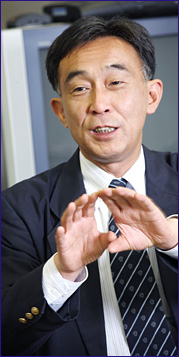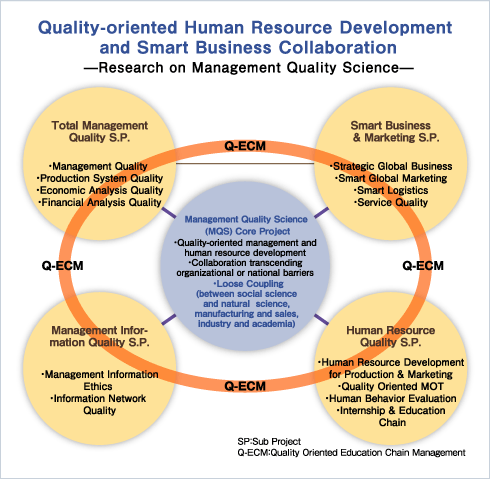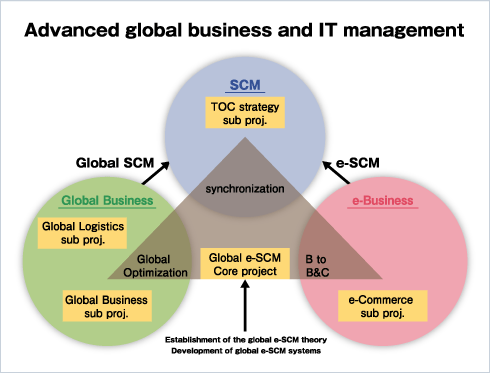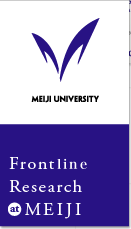

As corporate social responsibility (CSR) comes to the fore, the management quality of firms is being examined. However, corporate scandals continue to occur in Japan. “These scandals show that CSR is still insufficient among Japanese firms,” says Professor Hiroshi Yamashita, School of Commerce.
Professor Yamashita, who leads the Open Research Center (ORC) project team, is proposing a new discipline, namely “management quality science”, focused on the quality of corporate management from the viewpoint of CSR and QC (Quality Control).
Until now, management quality has been largely conceived of in terms of quality of products, emphasizing uniformity and stability achieved by “quality control,” which has been the advantage of Japanese firms. Another aspect is “management quality,” namely, consideration for customer service and environmental performance.
In addition, the scope of management quality science includes research on education chain management for quality-oriented human resource development (Q-ECM), based on the recognition that every aspect of business requires quality-oriented human resources. The project titled “Quality-oriented Human Resource Development and Smart Business Collaboration—Research on Management Quality Science—” is designated as an Open Research Center project by the Ministry of Education, Culture, Sports, Science and Technology (MEXT) for the five years from 2007.
Smart Business
This project emerged from the “Global Business and IT Management: Global e-SCM” project selected as a MEXT Academic Frontier project in 2003. In this research project preceding the management quality science project, Professor Yamashita and his team developed a system that deals with continuously changing bottlenecks (constraints) in a rapidly changing operating environment. This system, named the MAster Production Schedule system based on the Theory Of Constraints (MAPS-TOC), enables flexible scheduling of the flow of products and services from procurement of raw materials through production and logistics to end users (supply chain).This system automatically creates a master production schedule (MPS) for material requirements planning (MRP). It applies the theory of constraints (TOC), which is a logical approach associated with supply chain management (SCM), to MPS. This enables automatic preparation of MPS, taking into account continuously changing constraints.
The outcome of the Global e-SCM research is reflected and developed in management quality science. The Management Quality Science Core Project comprises three research themes: 1) quality-oriented management and human resource development, 2) total optimization transcending organizational or national barriers, and 3) collaboration between social science and natural science, manufacturing and sales, industry and academia. Management quality science integrates the research on total management quality, smart business, information quality, and human resources.

PDS Rather than PDCA
Professor Yamashita’s team is also involved in research on the management cycle. PDS (plan-do-see) is an approach designed to ensure the smooth accomplishment of tasks as scheduled. “The difference between the widely used PDCA cycle and PDS cycle is CA and S,” explains Professor Yamashita.With PDS, results of implementation are reviewed and utilized in the next planning phase. On the other hand, PDCA (plan-do-check-act) focuses on swift improvement based on a review of the outcomes. With PDCA, the step following “act” is “plan,” and thus, there is no step for reviewing the outcomes.
In reality, however, the outcomes should be reviewed and thus the cycle must be PDCAC. Moreover, PDCA’s emphasis on swift improvement based on the review would make the cycle PDCACA, and review of the outcomes would make the cycle PDCACAC. As a result, one would be trapped in an endless repetition of CA. From this viewpoint, PDS is much simpler and more logical than PDCA.
Furthermore, In a PDCA cycle, it is difficult to clearly distinguish between the “do” and “act” steps. Although the difference between “do” and “act” may be the degree of swiftness and timeliness, they are not fundamental factors distinguishing “do” and “act”, which makes PDCA complicated.
PDCA and PDS have both advantages and disadvantages. Since PDS is superior to PDCA in terms of simplicity, it is reasonable to view a management cycle as PDA rather than PDCA.
“A preoccupation with case studies makes it difficult to derive an approach suitable for general application. The goal of our research is to develop a simple and clear theoretical model applicable to any firm,” says Professor Yamashita.
Over 40 researchers specialized in diverse fields, such as commerce and engineering, not only from Meiji University but also from other university and institutions, are affiliated with the Center for Management Quality Science. Pursuing multifaceted approaches, they are working to establish a universal, general-purpose management theory.
As well as taking root in the concept of Q-ECM, Professor Yamashita and his colleagues are expanding the scope of quality control through their research with the aim of establishing management quality science as a new discipline that recognizes the importance of human resource development.

Profile
Professor Hiroshi Yamashita, School of Commerce, Director of the Center for Management Quality Science, specializing in information management, industrial engineering, human resource management, theory of management modelsBorn in Sumida Ward, Tokyo in 1957. Graduated from the Industrial Engineering Department, Science and Engineering Division, Waseda University. Completed the pre-doctorate course in the Science and Engineering Research Department, Waseda University. Conferred with a doctorate (engineering) by Waseda University and a doctorate (commerce) by Meiji University. Worked at Seikosha Co., Ltd. (production planning and production management operations), then as an assistant professor at Yamanashi Gakuin University and an assistant professor at the School of Commerce, Meiji University. Has been in his current position since 1999










